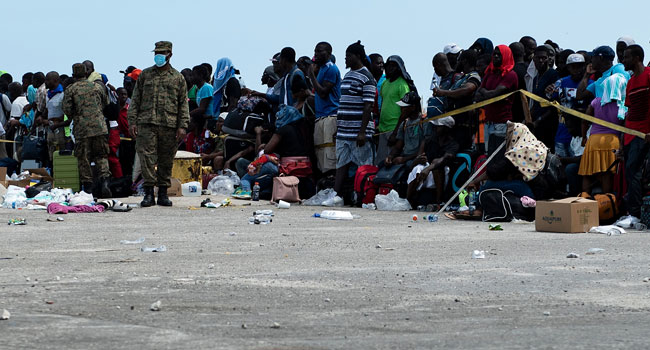
Bahamians who lost everything in the devastating passage of Hurricane Dorian were scrambling Saturday to escape the worst-hit islands by sea or by air, after the powerful storm left at least 43 people dead with officials fearing a “significantly” higher toll.
A loosely coordinated armada of passenger planes, helicopters and both private and government boats and ships — including redirected cruise liners — was converging on the horribly battered Abaco Islands to help with evacuations, both to Nassau and to the US mainland.
But Prime Minister Hubert Minnis said that “Nassau cannot possibly accommodate” all the Abaco victims. He said plans were being hammered out for constructing tents and other temporary accommodations, the Nassau Guardian reported Saturday.
For now, he said, supplies of food and water were adequate, though several witnesses from Abaco contested that.
A cruise ship carrying 1,400 evacuees arrived Saturday in Riviera Beach, Florida, CNN reported.
More than 260 Abacos residents arrived Friday in Nassau on a government-chartered ferry. Another, carrying 200, was set to leave on Saturday.
Residents said conditions on the islands were brutal. They said the smell of unrecovered bodies, along with mounting piles of garbage, was oppressive and unsanitary.
Hundreds or even thousands of people were still missing, officials said, as search-and-rescue teams continued their grim search. Morticians with body bags were beginning to arrive.
Minnis said the death toll — 35 so far in the Abacos and eight in Grand Bahama — was likely to climb “significantly.”
He called the loss of life “catastrophic and devastating.”
The final death toll “will be staggering,” Health Minister Duane Sands said earlier.
A UN World Food Program team estimated that 90 percent of buildings in Marsh Harbour were damaged.
UN relief officials said more than 70,000 people on Grand Bahama and Abaco were in need of assistance. The WFP was sending food and supplies.
The US Coast Guard, Britain’s Royal Navy and private organizations have been helping evacuate island residents to Nassau, hampered by damaged piers and airport runways.
The Coast Guard said Saturday, however, that all Bahamian ports had now reopened. It said it had deployed nine cutters to the islands and that six of its MH-60 Jayhawk helicopters had so far rescued 290 people.
‘It’s not right’
Chamika Durosier was waiting early Saturday at the Abaco airport. The island, she said, was unsafe.
“The home that we were in fell on us,” she said. “We had to crawl — got out crawling. By the grace of God we are alive.”
She described the increasingly desperate plight of those left behind.
“People have no food. People have no water, and it’s not right. They should have been gone.
“Dead bodies are still around and it’s not sanitary.”
At Marsh Harbour’s commercial port, Miralda Smith, a Haitian national, had arrived overnight on foot and was waiting in sweltering heat with dozens of other evacuees for passage to Nassau.
“We have no water, no electricity — we’re dying,” she said. “It’s really catastrophic.”
Many evacuees were Haitian workers who had seen their makeshift homes in a shantytown known as The Mudd completely flattened.
Those who have made it to safety awaited news of loved ones.
Diane Forbes was desperately searching for her two sons among some 200 evacuees at a shelter in Nassau.
On Tuesday, when last she heard from them, her sons told her that “they were hungry, and the scent of the bodies, the dead, was really getting to them.”
Dorian, a monstrous Category 5 hurricane when it raked through the Bahamas, was buffeting southwestern Nova Scotia, Canada, on Saturday with tropical storm-force winds, the National Hurricane Center said at 11:00 am (1500 GMT).
The Canadian Hurricane Centre predicted a landfall near Halifax and issued hurricane warnings for parts of Nova Scotia and Newfoundland.
Earlier, Dorian brought flooding and power outages but no major damage to the coastal Carolinas and Virginia.
In the Bahamas, the scene was very different, as the newly homeless were growing frustrated at the slow speed of relief and evacuation efforts.
“There’s no gas station, no food stores, my job is gone,” said Melanie Lowe of Marsh Harbour. She survived the storm packed in a two-bedroom apartment with 16 other people.
Hazmat suits and body bags
Arrangements were being made Saturday to care for the dead and account for the missing.
Mortuary workers in white hazmat suits, blue gloves and masks could be seen in Marsh Harbour carrying corpses in green body bags and loading them onto flatbed trucks.
President Donald Trump offered US support, adding in a video statement that “any cruise ship companies willing to act as stationary housing, etc., I am sure would be appreciated!”
At the Abaco airport on Saturday, Tanya McDermott was waiting with her husband and young son for a plane to Nassau.
With the injured given priority on outbound flights, they waited.
“We are going to wait around all day if we have to,” Tanya McDermott said.
“We are going to hope for the best.”
AFP

